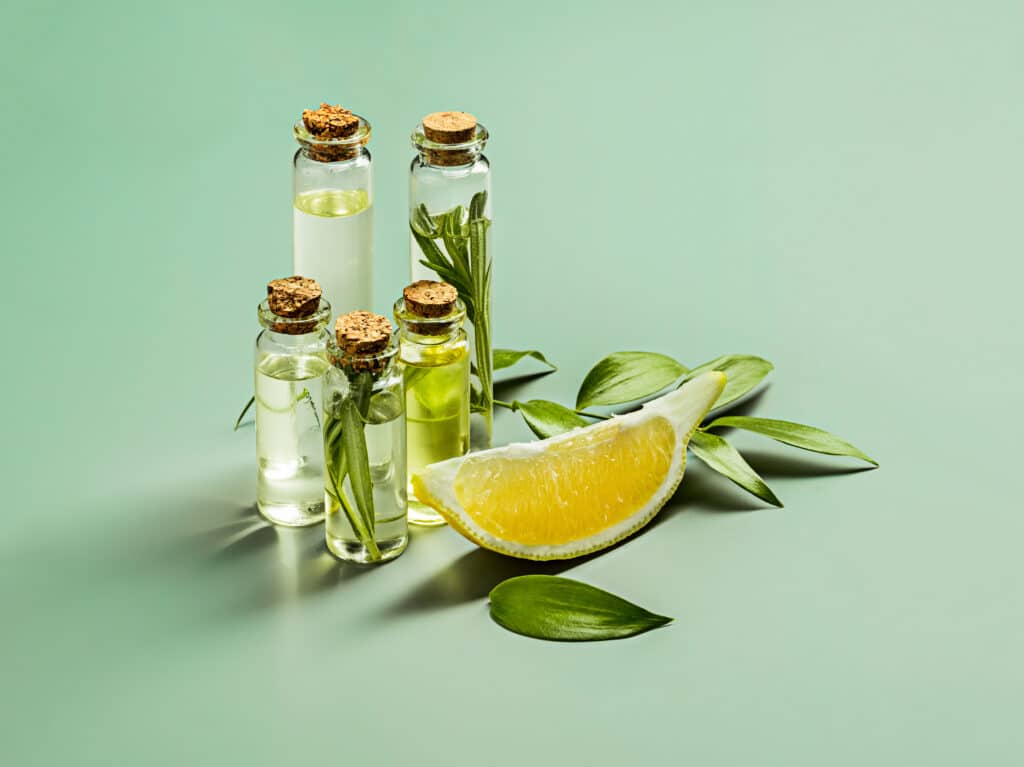The world of nutraceuticals is full of plant-based products or plant preparations. Phytotherapy, aromatherapy and gemmotherapy are all “disciplines” in which plants are in the limelight. Spotlight on the flagship ingredient of food supplements…

Phytotherapy, aromatherapy and gemmotherapy : different uses of plants in food supplements.
Phytotherapy : a discipline that encompasses a multitude of plants-based products and applications.
Phytotherapy is based on the use of plants, plants parts and plant-derived forms.
Thus, phytotherapy includes :
- medicinal plants registered to the Pharmacopoeia,
- Pharmaceutical preparations made in pharmacy,
- Derived medicinal products,
- Herbal medicines
- Food supplements.
Moreover, plants are very popular in food supplements ! Indeed, 64% of supplements contain at least one plant(1). This represents 63% of the turnover of food supplements in 2017(1).
Their use in food supplements is regulated and framed by decree n°2006-352 and the order of 24 June 2014.
See : The dietary supplements market in 2021: deciphering.
Aromatherapy : essential oils to express the power of plants.
Aromatherapy is a branch of phytotherapy and uses essential oils. Essential oils are defined as volatile odorous substances produced by certain plants. They can be extracted in liquid form by steam distillation or dry distillation as well as mechanically by cold pressing(2).
The main essential oils marketed (by volume) are: tea tree, ravintsara, lavender, peppermint and wintergreen. Sales of the first two were boosted in part by the context of the Covid-19 pandemic(3). It represents 206 million euros in pharmacies and parapharmacies in 2020(3). Moreover, essential oils are the 4th most consumed food supplements (27%), after vitamins and minerals, beehive products and omegas 3, 6 and 9 (4).
At Nutra Skills, we are able to disperse essential oils and macerates to propose them in dry form (powder, tablets and capsules), that represents 70 to 80% of the market.
This impregnation know-how is very technical, the possible quantities of active ingredients to be used are dependent on each formulation.
Gemmotherapy: in its early stages of development, plants are already revealing their health benefits.
Like aromatherapy, gemmotherapy is an integral part of phytotherapy. Gemmotherapy is based on products made from the embryonic tissues of plants: buds, young shoots and rootlets.
Less known to the general public, sales of gemmotherapy products amounted to 3.3 million euros in pharmacies and parapharmacy stores in 2020(3). Among the best-selling plants, blackcurrant tops the list with its characteristic “amplifying the effect of other buds”. It is followed by: fig, hawthorn and lime.
How do consumers perceive the use of plants in food supplements ?
Today’s consumers are increasingly wary of drug treatments and are therefore looking for “softer” alternatives.
The use of plants is a response to this consumer quest. Moreover, the “natural” aspect of health products is an important criterion for 80% of consumers(4). The presence of plants in food supplements is synonymous with naturalness for the consumer. Thus, “plant-based” solutions are perceived as “gentler” and “natural”.
Also, the use of plants refers to a more “traditionnal, even ancestral” medicinal approach, which has proven hitself, and reassures the consumer.
Consumer interest in herbs in dietary supplements is showing no signs of abating with the use of ‘new‘ trendy herbs such as CBD or ayurvedic herbs such as ashwagandha.
See : CBD in spotlight.
How to innovate with plants in food supplements ?
In order to stand out with one of the most used raw materials on the market, technicality is required, particularly in the extraction stage. The aim is to guarantee the conservation of the active ingredients and, ultimately, the effectiveness of the extracts.
Also, about extraction processes, innovation passes through greenest process such as :
- The choice of solvants : water, ethanol or even supercritical CO2,
- The optimisation of process : reduction of energetic consumption,
- Valorization of trashes or upcycling
Another innovation lever is the sourcing of ingredients :
- An organic label : a vector of trust for the consumer of food supplements and also,
- Relocation of sourcing: against the trend towards “local”, the aim here is to respect the original biotope of the plant in order to guarantee the quality of the extracts. This approach requires consumer education and transparent communication.
See : Innovative food suplements : the keys to success.
Plants in food supplements are essential, whatever their form! They provide an answer to many consumers looking for natural health products. Despite their ancestral use, plants remain a “trendy” ingredient, and suppliers of food supplements still have several avenues to explore to reveal all their benefits.